"A hunting trip on the Spatsizi Plateau, led by guide-outfitter Tommy Walker of Cold Fish Lake Camp" British Columbia Archives.
This film was produced at some time during the 1950s or 1960s.
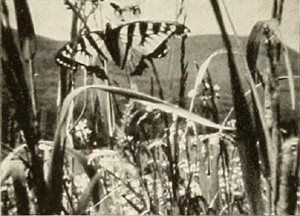
"Robert P. Kehoe, who won Honorable Mention last year with Chromatic Rhapsody, has "done it again" — only more so. In Wildflowers, with his own inimitable magic, he has gathered into light and color all the lazy loveliness of high summer. Here, as if he talked their secret language, bees drone and butterflies dance before his lens. Daisies and buttercups, the wild geranium and "butter and eggs" — a dozen flowers you do know and a score you have forgotten — nod in the warm sun with simple and unassuming beauty. Often, six blades of grass and a single bloom will comprise a moment of ineffable gaiety and song. The rough wood of a slanting black post gives accent to a field of daisies, or the delicate tracery of a "four o'clock" is a breath taking frame for a summer sunset. In Wildflowers, Mr. Kehoe has written once again a lyric testament to nature's incomparable loveliness." Movie Makers, Dec. 1940, 600.
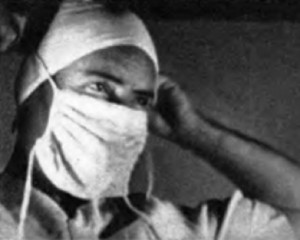
"The Will and the Way is a simple story of '"little people" — but it looms large in its appeal to the human heart. There are, in its tender adventures, the laughter of sympathy and the tears of pathos. From these, as from any great expression of beauty, there comes the genuine and ennobling uplift of the spirit which is so rare in a workaday world. Chester Glassley has been equal to his task. His photography, both indoors and out, is as nearly flawless as skill and patience will permit. His camera treatment is marked by a wise concentration on close views, a dramatic selection of angles and a fine sense of matching and contrasting color values. Good cutting, paired with a brilliantly executed montage sequence, rounds out the technical achievements. But his greatest production triumph lies in the casting and direction of the two lead players, who bring to the amateur screen its most genuine and sensitive acting to date. A young wife is to have a baby. Because of a harsh experience with a rum sodden doctor, she turns blindly toward the thought of going only to a specialist, a great obstetrician, famed both for his fine care and his $1000 fees. Her young husband's reaction as he learns of this feeling is the simple theme of the entire story: "I don't know where we'll get the money, but if that's the doctor you want, then that's the doctor you're going to get!" From then on. life for the young couple is a race against time, punctuated for the husband by a frantic search for cash, which leads him through the indignities of a pie eating contest, the insults of '"amateur night" and the bruises and battering of a vastly unequal prize fight. But the baby wins in the end. The harried father collects only three hundred dollars of the specialist's fee, a sum he begs the great doctor to accept as a down payment. This the physician does, only to return the entire amount later — with a receipted bill — as his tribute to the boy's courage. The Will and the Way is a short, unassuming film, made technically with the simplest tools provided by the craft. But, in its unfailing imagination, its moving tenderness and. above all. in its deep understanding of the human heart, this film is a proud peer among its colleagues of the Hiram Percy Maxim Award." Movie Makers, Dec. 1940, 576-577.
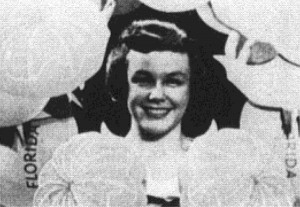
"Our man has been through a long, hard winter and with more snow on the way he goes to Florida. We visit many of the places and see and do the things vacationers like to do. We move from one interest to another and stay just long enough to like it. Our friend awakens from his Florida visit and sunburn, all from his over-long stay under the sun lamp. A delightful visit" PSA Journal, Nov. 1960, 40.
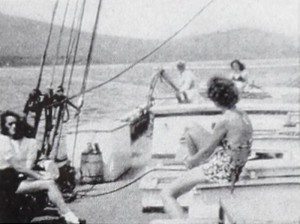
"Sidney Moritz likes to record the few vestiges that remain in this rapidly changing country of the days that were. After earlier voyages on an Ohio River "sternwheeler," he made two cruises on the Mattie, an old schooner that now hugs the New England coast and carries vacationers. In Windjammer there is cinematic beauty, with delightful scenes of masts and sails. There is also a detailed and very human record of the way in which the holiday makers — who also help with the ship's chores — enjoy a recreation both salty and salubrious. One is sure that they and the ship's crew — including grim old Captain Grant — had a grand time. Mr. Moritz must have had one, also, if his gay footage reflects his mood." Movie Makers, Dec. 1945, 497.
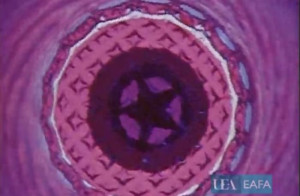
Animated film of windmills and revolving multi-coloured shapes and patterns, in time to the tune 'Windmills of My Mind' (EAFA)
"Winged Hickory on the high snow-covered slopes in the area of Aspen, Colorado (not far from Denver) is a nostalgic piece of winter ski sports by Theodore H. Sarchin. Aspen is a famous old, deserted silver mining town that has been rejuvenated by ski enthusiasts taking advantage of the excellent slopes and weather conditions. The ski lift is the longest in the world. It requires 40 minutes to ride its full length, in two sections, to an elevation of 11,300 feet. There are beginner and novice trails and challenging slopes for the experienced skier. There are vistas of the towering snow-covered mountains as well as activities in camp. During one of the Gala Days, Mr. Sarchin photographed some unusually expert skiers, such as one on tall stilts, and four men on two long skis, sort of like four men on a horse. The beauty and grace of the skiers, speeding along with the snow feathering out behind, make the rugged beauty of the terrain an outstanding picture. The background music is well chosen and Mr. Sarchin's narration is adequate" PSA Journal, Nov. 1957, 53.
"A documentary made in association with the Bournemouth, Poole and Christchurch Wing of the Air Training Corps (ATC) produced under the auspices of the Air Ministry. A young man works in a grocer's shop and wraps up slices of bacon in a newspaper telling of Hitler' s victories. He cuts out a piece about the ATC. With friends he goes to the cinema (the Moderne) to see 'Week-End in Havana' (1941) and in the foyer signs up for the ATC as a flight mechanic. (EAFA Database)
Total Pages: 299